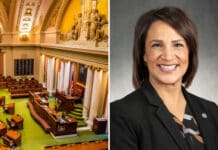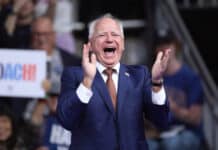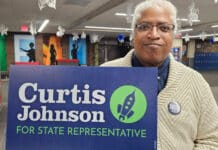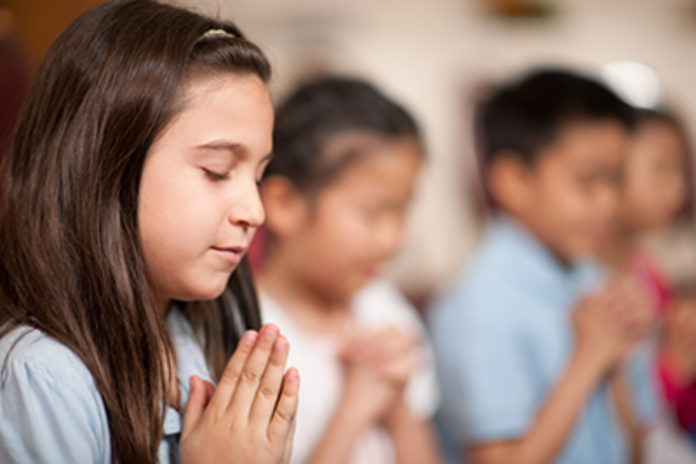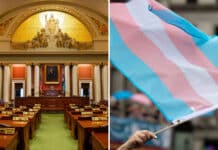In a culture where public school policies are increasingly pushing parents out of important conversations about their child’s sexual identity and gender expression, Catholic educators need to take an opposite approach, speakers told two gatherings of pastors, Catholic school leaders and religious education directors Feb. 20-21.
Sponsored by the Archdiocese of St. Paul and Minneapolis’ Office for the Mission of Catholic Education, the seminar sought to explain the recent document from the Vatican Congregation for Catholic Education on the danger of gender theory, “Male and Female He Created Them.”
Catholic families are not immune to the influences of “gender theory,” or the ideology that a person’s identity as male or female is independent of his or her biological sex, said Mary Rice Hasson, one of the featured speakers at the four-hour seminar.
But those Catholic families deserve parishes and schools that support them with a vision of the human person rooted in the Church’s teaching, she said, not one that simply affirms a child’s desire to be known as someone opposite their biological sex or living on a gender spectrum.
An attorney and fellow at the Ethics and Public Policy Center in Washington, D.C., as well as the director of the Catholic Women’s Forum, Hasson said that Church leaders need to take their cue about how to deal with this issue from Pope Francis.
Pope Francis has emphasized the importance of pastoral accompaniment that “starts with the person,” while speaking clearly about gender ideology, calling it “wicked” and “a global war” on the family, Hasson said. He has spoken of the need to combat gender theory as an ideology, as it seeks to erase the idea of family and the complementarity of men and women, she said.
The theory has spread internationally and been embraced by influential governments, businesses and advocacy groups, and its promoters often use intimidation to squelch a traditional view of creation, calling it bigotry, she said.
Meanwhile, the number of people who identify as transgender or “non-binary,” meaning they don’t identify as either male or female, is growing, Hasson said, and medical and psychological standards of care in the U.S. now favor assisting children experiencing identity confusion in changing their bodies to affirm their desired gender identity, regardless of parents’ wishes.
In Minnesota, public schools are expected to affirm the gender expressions of students who identify as transgender or “gender nonconforming,” said Emily Dahdah, associate director of catholic education for the archdiocese.
The Minnesota Department of Education’s 2017 “Toolkit for Ensuring Safe and Supportive Schools for Transgender and Gender Nonconforming Students,” the document on best practice recommendations for the state’s public schools, states that schools should relate to students according to the student’s “gender identity” instead of his or her biological sex. The approach to these issues in the toolkit forms the basis for the training of teachers on the topic of gender identity according to the state’s new culture competency for teacher relicensure, Dahdah said.
Some districts’ policies are thoroughly grounded in gender theory in their understanding of the human person, she said, noting that the policies begin with a list of definitions, “because the policies otherwise don’t make sense from a worldview outside of the one proposed by gender theory.”
Dahdah explained that these policies require that students be addressed by their preferred pronouns and allowed to use facilities, such as bathrooms and locker rooms, and overnight accommodations “consistent with their gender identity” which may or may not be the same as the students’ biological sex. Students must also be allowed to play on sports teams according to their gender identity, not biological sex.
Some district policies require district staff to honor a child’s request to use names, pronouns, bathrooms and lockers room that align with a student’s declared gender identity regardless of parental consent.
“In a local public school district in the Twin Cities, school employees are expected to affirm a child’s desire (to express an identity that differs from his or her biological sex) ‘regardless of parental consent.’ This phrase ‘regardless of parental consent’ occurs over and over again in the district’s written expectations for how district staff will implement the gender inclusion policy,” Dahdah said.
She explained that in these procedures, staff are told to let the child determine how information about a child’s gender identity is shared with parents.
“So If John — who is a biological male and desires to assert a female gender identity — wants to be called Mary, the child can tell the teachers to call ‘her’ Mary at school, but refer to the child as John when speaking with the child’s parents,” she said.
Beyond guidelines and policies about how public schools are expected to relate to people who identify as transgender or gender nonconforming, gender theory permeates public school culture, Hasson said.
“One thing that parents erroneously assume is that they can opt their kids out of problematic content, or they can shield their kids from problematic content. The problem is, this is coming in through the culture of the school,” she said. “You can’t opt out of culture, and so it is changing the way our kids are thinking in every way: the vocabulary that’s used, the celebrations that occur, then being forced to use someone’s chosen name or pronoun.
“An insidious aspect of what’s going on in public schools is that parents are being kept in the dark. They’re being shut out of the conversation,” she continued. “Schools are judging whether parents are safe to be brought into the conversation of whether their child is going to be transitioned at school, whether that child’s going to be allowed to assume a different name and be treated like the opposite sex. That’s tremendously dangerous.”
However, in the dissonance between the Catholic worldview and gender theory, Hasson cautioned the audience to “presume the best of even those with whom we disagree.”
“Because what we do share is a common desire to alleviate people’s suffering, to help people find a way to flourish in what can be a very confusing culture,” Hasson said.
Catholics should, however, be aware that advocacy organizations are targeting Christians “to find people of goodwill who acknowledge the dignity of every person, who have hearts of compassion, who want to help,” she said. “But then what we’re seeing is that people with an agenda are telling us what to believe, telling us what our faith should teach.”
The seminar on sexual identity and gender theory was the first in a new annual series, Emerging Questions in Catholic Education. Held at St. Maron in Minneapolis, the event included Hasson and two other featured speakers: Dr. Monique Robles, a pediatric critical care physician who outlined bioethical issues around medical treatment of patients who identify as transgender, and Theresa Farnan, a moral philosopher who provided theological and pastoral context for gender theory. The seminar also included remarks from local leaders and a panel Q&A discussion.
In addition to the speakers and panelists, Archbishop Bernard Hebda gave welcome remarks and Auxiliary Bishop Andrew Cozzens, the archdiocese’s vicar for Catholic education, spoke about the Minnesota bishops’ new guiding principles from the state’s Catholic bishops on human sexuality and sexual identity in Catholic schools and religious education programs.
Those guiding principles for Catholic school leaders, pastors and religious education directors counsel them to affirm an individual’s “sexual identity,” or biological sex, and to involve parents if concerns arise about a student’s expression of his or her sexual identity.
The seminar was offered twice, Feb. 20 and 21: the first day for principals and pastors with schools, and the second day for parish religious education directors and pastors without schools.
____________
This article was reprinted with permission from The Catholic Spirit.



